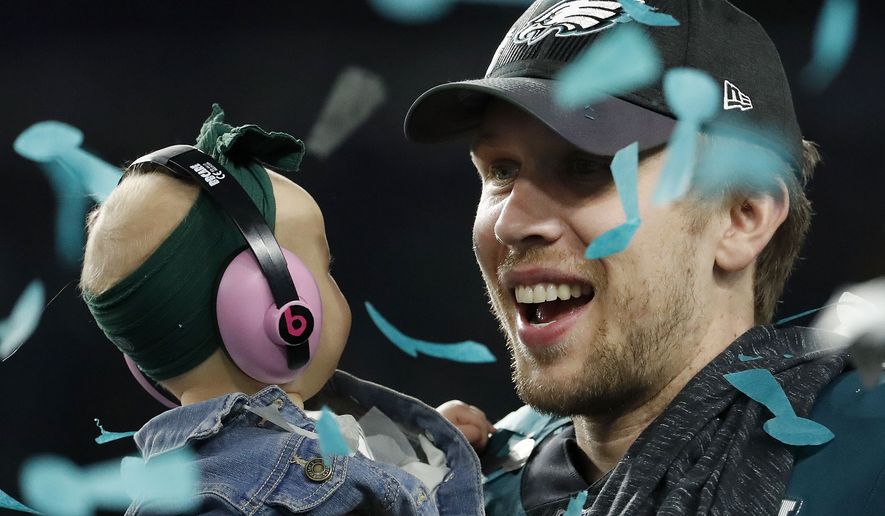Super Bowl 52 was NFL’s gift for those who still partake

By DERON SNYDER (as published in The Washington Times)
The 2017 season was a rough one for the NFL, full of political potshots, lower TV ratings, higher fan apathy, questionable replay rulings and controversial concussion protocols.
The league needed a great Super Bowl to drown its sorrow, at least for one night, and Philadelphia and New England delivered (unless you’re an aficionado of stout defenses).
That’s not to suggest the NFL’s troubles magically disappeared in the Eagles’ 41-33 upset over the Patriots.
President Trump was at it again, releasing a pre-game message about our freedom “as we proudly stand for the National Anthem.” Protesters blocked a light-rail line to the stadium. A Wall Street Journal/NBC News poll released Friday concluded that the league’s core audience has suffered a 9% decrease in interest since 2014.
There was no escape from familiar on-the-field woes either.
New England wideout Brandin Cooks absorbed a wicked-hard helmet-to-helmet hit early in the second quarter and didn’t return. He was diagnosed with “a head injury,” presumably a kinder-gentler euphemism for concussions. (Maybe the NFL will follow hockey’s lead and describe all future injuries as head, lower body or upper body).
Instant replay and the catch rule made a couple of grand appearances, too.
Both times, officials initially ruled the plays as Philadelphia touchdown receptions. Viewers watched several replays and divided into three camps: Patriots fans who thought the catches should be overruled; Eagles fans who believed the calls should stand; conspiracy fans who concluded New England would get the benefit of the doubt because New England gets ALL the calls.
A bunch of similar plays were reversed during the season and these two easily could’ve gone the same way – especially the catch by halfback Corey Clement, who appeared to bobble the ball before stepping on the end line.
But much to everyone’s surprise, Clement’s touchdown stood, as did the go-ahead score with 2:25 remaining, when tight end Zach Ertz dove into the end zone and the ball squirted out as he hit the ground.
Commissioner Roger Goodell said he wants the league to “start over again” on the catch rule.
That’s an easy task compared to addressing the other issues facing America’s most popular sport.
But for those of us who watched the Super Bowl – because we weren’t too upset over player protests, Colin Kaepernick’s blackballing, or football’s brain-rattling hits – the game rewarded our faithfulness.
The teams combined for 1,151 yards of offense. No Super Bowl game ever saw more yardage. No postseason game, either. In fact, no NFL game, period, ever featured that many total yards. The previous record was set in 1950.
New England QB Tom Brady threw for 505 yards, an NFL postseason record, and three of his receivers topped 100 yards (Danny Amendola, 152; Chris Hogan, 128; and Rob Gronkowski, 116). Philadelphia QB Nick Foles became the first player to throw and catch a touchdown in the same Super Bowl. His 1-yard reception on a 4th-and-goal play displayed coach Doug Pederson’s tremendous testicular fortitude.
“We worked on that play since the postseason started,” Pederson said afterward. “We just needed the right time, right opportunity, and the guys executed it brilliantly.”
With thoughts of New England’s comeback from a 28-3 deficit against Atlanta in last year’s Super Bowl, Pederson knew no lead was safe. Philadelphia had a 10-point margin midway through the third, but, sure enough, the Patriots took their first lead with 922 left in the game.
That was the perfect opportunity to wilt. But the Eagles were undeterred, driving 75 yards in 14 plays, capped by Ertz’s score. Then a defense finally made a play. Philly recorded the game’s first and only sack, recovering Brady’s fumble in the process and tacking on a field goal.
Everyone held their breath on the game’s final play, New England’s Hail Mary that could’ve led to a game-tying, overtime-forcing two-point conversion. Gronkowski had a better shot than the Eagles liked, but the pass fell to the ground with the clock on 0:00.
As for storylines, they don’t come any better than Foles leading the underdogs to victory against Brady’s dynasty. He nearly quit football after the 2015 season before signing to be Alex Smith’s backup in Kansas City. Now Foles is the Super Bowl 52 MVP, ending his sterling postseason with a 28-for-43, 373-yard performance. He threw three TDs, one not-his-fault interception, and took no sacks.
“I think the big thing that helped me was knowing that I didn’t have to be Superman,” Foles said afterward.
But he helped Philly beat a super franchise, an organization that was making its eighth Super Bowl appearance in 17 seasons.
The victory does wonders for also-ran teams and their fans across the league. Cleveland? Detroit? Cincinnati? If the Eagles can win a championship against the vaunted Patriots, anything is possible.
Goodell & Co. can worry about the plethora of concerns on the NFL’s plate. Elected officials can continue to bash the league. Fans who are protesting or simply disillusioned can carry on with their NFL-free lives.
As for the rest of us, Super Bowl 52 was a reminder of why we still watch.
We might be fewer in number.
But we enjoyed the game nonetheless.
— Brooklyn-born and Howard-educated, Deron Snyder writes his award-winning column for The Washington Times on Tuesdays and Thursdays. Follow him on Twitter @DeronSnyder.
 Follow
Follow
